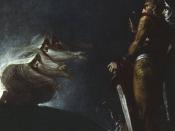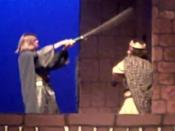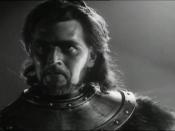Macbeth - Act IV - Literature Log - #1 - My own insights from reading this section
After reading this climactic portion of Shakespeare's enticing play, "Macbeth", I am filled with a plethora of different remarks and thoughts about several of the character's inner feelings and ambitions. It is not clear to the reader what the characters are actually expressing, but their feelings can be inferred from the surrounding text and the reader's basic understanding of all human nature.
The main predicament that presented itself in this section was the three prophecies which the apparitions gave Macbeth. The first apparition was an armed head that warns Macbeth to beware the Thane of Fife, namely, Macduff. The second apparition was a bloody child, who tells him that "none of woman born shall harm Macbeth." Hearing this, Macbeth becomes reinforced, and states that he no longer needs to fear Macduff. The third apparition was a child wearing a crown, with a tree in its hand, who says that "Macbeth shall never vanquished be until Great Birnam Wood to high Dunsinane Hill shall come against him."
This cheers Macbeth even more, since he knows that nothing can move a forest. However, Macbeth now asks his last question; will Banquo's children ever rule Scotland? Will Macbeth's rule ever be ended? The apparitions tell contrasting details regarding Macbeth's continuing rule, yet I believe that from analyzing the text, it can be inferred that Macbeth's rule will eventually come to an end. For example, when the third apparition states, "Macbeth shall never vanquished be until Great Birnam Wood to high Dunsinane Hill shall come against him," Macbeth is elated, for it is physically impossible to move the great forest to his castle. However, Macbeth's narrow-minded and overly-ambitious character can be seen here for he forgets to think about one significant detail. Couldn't it be possible for the castle to come down to Great Birnam Woods instead of the other way around? Malcolm's gigantic army could make this a reality, for since Macbeth's castle rests on a hilltop, when it is destroyed, its fragments will topple over into the forest. Thus, just as the witch's prophecies came true before, they consequently will come true again with the end of Macbeth's rule and the prosperity of Banquo's sons.
Another interesting point that I witnessed in this section is Shakespeare's use of children in the last three visions. Why would Shakespeare now use children in a novel so dominated by adults? Normally children are regarded as innocent, but here they are involved in images of death, which are all so dramatic, terrifying and bloody. The choice of these images is carefully made so as to annoy Macbeth, who has no offspring. Furthermore, perhaps Macbeth's hallucinations are actually always images of his desires, not those of fears as I have previously speculated. For example, perhaps Macbeth wanted Banquo to enjoy in the feast of Act III and hoped for his friendship once again, which is why he had a hallucination of Banquo at his coronation dinner. Furthermore, perhaps Macbeth actually wanted to kill Duncan to become king instead of just being pushed by Lady Macbeth to do so, for he also dreamt of an imaginary dagger. Now, he is hallucinating about having sons and a continuous line of kings, as portrayed by the line of eight kings and the three children in the apparitions.
I found that one of the most peculiar aspects of this section is regarding the motivation of Macduff's desertion of his family to go south to England. In my opinion, I believe that the reason for Macduff's abandonment of his family lies in the fact that Shakespeare is trying to express that one should strive for the better of many and not just themselves or a small group of others. People shouldn't be selfish and should consider the needs of the larger majority, a view that many people shared in Shakespeare's time. During this era, according to the Barron's World History AP Book, almost 90% of Europe's wealth was concentrated within the top 3% of the population. Thus, the majority of this community was populated by poor peasants, probably much like Shakespeare himself. Thus, Shakespeare is expressing his views of the Enlightenment (an era of a desire for equality and increased rights) through his literary work. He is struggling to express his desire for a greater economic advantage for all of his poverty-stricken society, which he expresses through the theme that people shouldn't be greedy and that we should utilize teamwork as a larger majority to accomplish incredible tasks of equality. Similarly, this notion is expressed the "To Kill a Mockingbird", for Atticus describes that as a comprehensive group with teamwork and a majority, we can accomplish great tasks, such as the destruction of racial discrimination. This is shown by Scout who singled out Mr. Cunningham in the mob scene at the jail, and by doing so, she depleted the horde's strength, subsequently causing it to disintegrate. Thus, Shakespeare is expressing that our loyalties and efforts should be unselfishly given to a majority rather than acquisitively keeping ourselves from doing good.
Ironically, Lady Macduff believes that she will be safe, because by staying in Scotland, she indicates that she has allegiance to Macbeth. She must think that Macbeth possesses honor, but ironically, she is gravely mistaken. Lady Macduff clearly does not see what is going to happen, but the audience knows, for they were given an insight into Macbeth's plans in the previous scenes, remembering the treacherous and literal back-stabbing actions carried out by Macbeth. The theme of loyalty continues in Scene iii where Malcolm tests Macduff's allegiance. He is eventually convinced, and Malcolm warmly welcomes Macduff into the struggle against the tyrant, Macbeth. Immediately after reading this, I was stricken at the dreadfulness of Malcolm's utter inability to trust someone of his own clan, Macduff, even though they have been through so much together, such as the death of Duncan. However, after careful thinking, I have come to a conclusion that this is a truly sad feature of life, which, although hated, must be accepted as fact. For example, in school, I once told my friends that I liked this girl. However, even after swearing that they wouldn't tell anybody, the still went and told everybody behind my back. Furthermore, in The Lord of the Flies, although Piggy and Ralph were friends at first, Ralph soon abandoned Piggy and somewhat taunted him like the rest of the boys. These incidents further exemplify an overall primary theme in both the novel and life, just as Fair and Foul are Near of Kin does, as already mentioned in the Act I literature logs. The only thing that you can trust is yourself, and in certain cases, not even that (look at Macbeth's denial of his two contrasting personas). Ultimately, Shakespeare is remarking that, despite the sadness of not being able to trust anybody, never judge a book by its cover.





